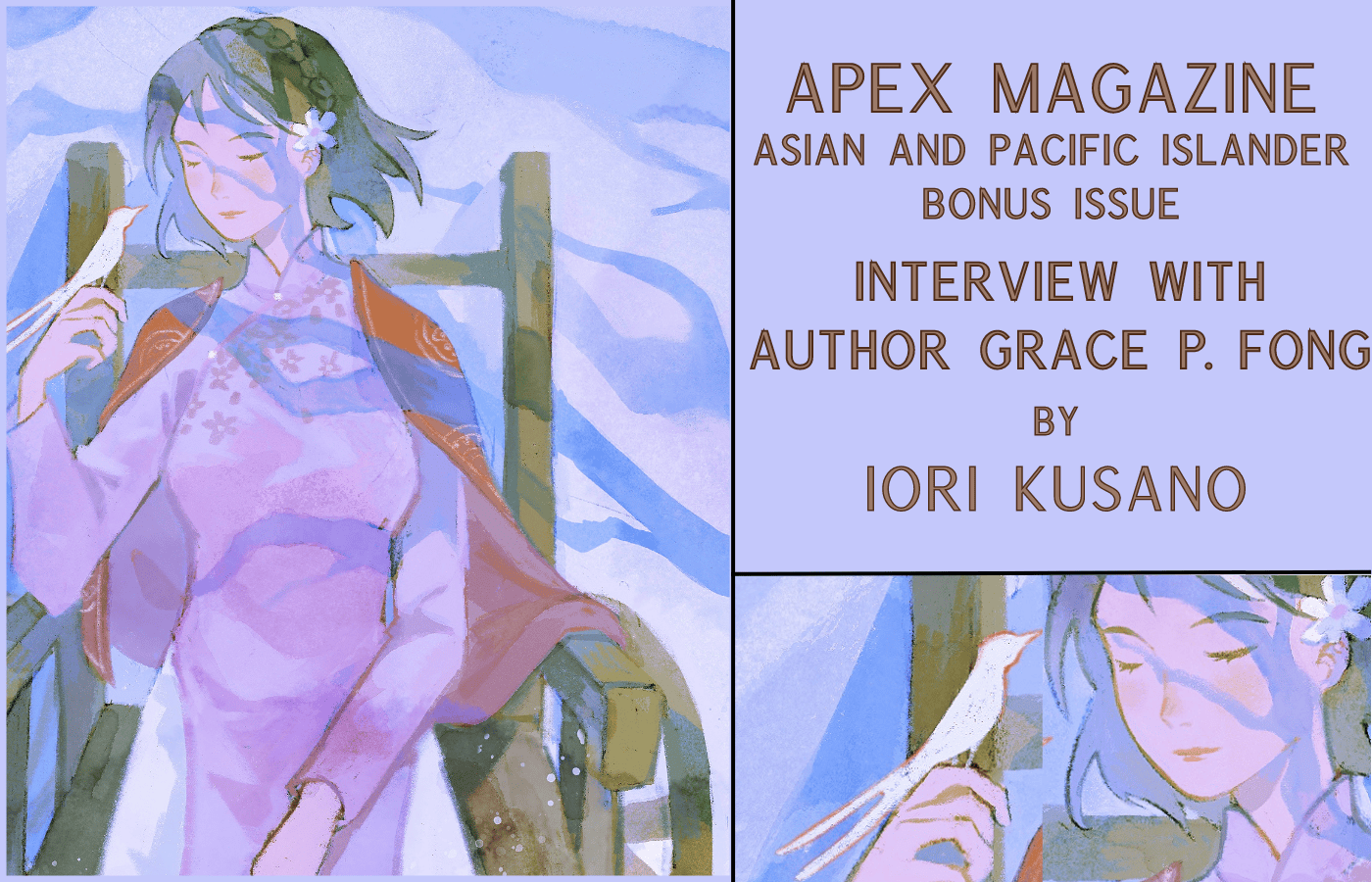
Hollywood, land of vivid colors and a thousand glittering dreams. Anyone can be a star, even a laundry girl. Grace P. Fong's “The Toll of the Snake” digs in to the dark underside of show business and the cost of ambition.
This story is set in Golden Age Hollywood, but as social media lures—or drags—more ordinary people into the public eye every day, the weight of fame sits heavier on everyone's shoulders. Why do people want it? What benefits does it have, and how do those stack up against the dangers it exposes you to? Fong unpacks these questions in her story, and loops in an exciting combination of myths in the process.
Grace P. Fong is a Chinese-American author-illustrator whose writing and artwork have appeared in Uncanny Magazine, Apex Magazine, Tor.com, Strange Horizons, and others. Her writing has won an award from FIYAH x Levar Burton Reads's short fiction contest, and her art has been nominated four times for the Best Fan Artist Hugo Award, and won the inaugural Ignyte Award in 2020. In addition, she has worked as a narrative designer in tabletop/trading card games (Magic: the Gathering) and video gaming (Palia). Follow her work athttp://www.gracepfong.com.
Spoilers abound; I suggest you read “The Toll of the Snake” first!
Iori Kusano: This story is really striking in how you tie the myth of Medusa to the history of Chinese immigration, the upheaval of the 1940s, and Old Hollywood. You've woven in a lot of little details such as the Hayes Code and name-dropping real studios and celebrities to anchor the story in its era. Did you come across some historical anecdote or bit of trivia somewhere that particularly inspired you? If you did any research for this piece, where did it fit into your writing process?
Grace P. Fong: To be honest, I was inspired by the eight years I lived and worked in Los Angeles's massive media industry. When you work in high-visibility industries like movies and video games, you realize there is a deep cognitive dissonance between the inside grind and the outward glamour. The whole environment suggests stardom is attractive and attainable, but that positivity is rooted in marketing and image-making. Studios are run like businesses, and beauty is sold to America as a product. With little room for individual artistry, creatives struggle managing their jobs' romantic projections and their selves' true identities (this friction features in a lot of my work, not just this one). As with many consumer products, art becomes a reflection of the cultural zeitgeist: what feelings and experiences do people want to buy at this time? That question directed my research.
I chose the period right after the Second World War because Hollywood's myth making directly mirrored how the United States rebranded its own identity as an aspirational world superpower. I looked for specifics that people of the time would recognize and develop feelings about, and manifested those feelings in my characters. My main character shares the background and feelings of silent film star, Anna May Wong, and the behavior of her studio members are inspired by stories of those soldiers who'd been overseas.
IK: You've achieved a very distinct "Golden Age of Hollywood" style of dialogue in this story, using not only vocabulary choice but cadence. When I read this piece, I caught myself reading the dialogue out loud in my best imitation of that fast-talking transatlantic accent. Were there any particular sources you drew on as research or inspiration to capture that particular rhythm?
GPF: They say the fastest way to learn a language is to go somewhere where people speak it, right? I believe we're social creatures, so all human beings are born with some capacity to linguistically adapt to our surroundings. After all, code-switching is a common, and often unconscious, practice. So, I just turned on the television and inundated my brain with period movies until my 'internal voice' could mimic the cadence of the media I was watching. The only note is that I made sure to watch a number of films made during that time period as well as modern films made about that era. The former let me see how people of the time thought of and presented themselves. The latter was to make sure that the voice I developed was one that could still be understood by today's audience. I mean, we make medieval characters speak like they're from the modern UK because no one today will understand real Middle English, haha. (Check YouTube if you're curious what Middle English sounds like. It's neat!)
IK: Minerva Kingsley and Porter Simpkin both tokenize and manipulate Mei-Ko as they put her to work, but I'm curious to know which of them you find more loathsome—or are they equally awful to you?
GPF: Oddly enough, I actually don't loathe either of them. They were really fun to write. I keep in mind that they're only self-centered because their choices stem from insular privilege. In a different society, they might have been truly kind people, even allies to the protagonist. When we label a character as a "uniquely bad person different from us," we absolve ourselves of responsibility. When we see a bad guy fridge the innocent girlfriend, we can tell ourselves, "I'd never do that! There's clearly something wrong with him! He's a villain!" I choose to write antagonists who are manifestations of their society because I want audiences to recognize they participate in society ... and could just as easily fall prey to and replicate similar behaviors. Neither Kingsley nor Simpkin would physically abuse someone, but they hurt by omission and by elevating the white gaze because that's what their society expects (and even encourages). In order to change society, we must first recognize that we form society.
IK: "Girl Oil" was one of my favorite stories in 2022, so I was really excited to see you revisit its show-business and image-curation themes. I also see some overlap with your story "For Want of Milk" in how the main character is a member of the diaspora navigating a hostile majority culture. Are there any particular themes from "Toll of the Snake" you're hoping to revisit or carry forward in future stories?
GPF: I should have another short story inUncanny Magazine soon, but after that ... Probably? I did just admit that I never know what my next project will be, haha. On a personal level, it's hard for me to escape those central themes because I grew up with and intimately feel them on a subconscious level. After all, navigating life as a minority (be it race, gender, sexuality, etc ...) requires just as much image-management as show business. I think I'll need more word count to tackle the topic that naturally follows: how do people handle that social pressure? Do they fold? Do they fight back? Do they hurt others? I believe the pervasiveness of the Hero's Journey structure has made us expect only one type of positive, self-affirming outcome,but I want to explore other endings. Not everyone can be or wants to be a likeable main character.
IK: You've showcased some of the creative work you do for your day job on social media in the past. A common complaint of a lot of "career creatives" is that it becomes difficult to balance studio/corporate work vs. independent work. How do you find bandwidth to keep up with [prioritize?] your personal creative work?
GPF: Oh no ... are you sure you want this answer? Because it's 'I struggle. I struggle very hard.' I plan a lot of things, but they often get interrupted. So, I approach personal writing with a mindset similar to the "Agile" development method found in tech firms. I look at all the possibilities and how much time I have. Then I try to see what's most interesting and most manageable, and that's the one I do first. I think this mindset has led me to become so oddly multi-disciplinary. When it comes to my personal work, I do whatever I feel most inspired by at the time: art, writing, game design, who knows? My creative hero is Guillermo del Toro because he makes anything: movies, comics, books, whatever the best medium is the story he wants to tell. This approach is a little weird and certainly not great for brand-building in a capitalist hellscape, but it works for me. I think it makes me unique and gives me resilience in the career marketplace. I write stories, but life's not a story. It doesn't have to have a pithy, one-line elevator pitch, so why limit myself?
IK: What have you recently enjoyed reading that fans of this story might like?
GPF: I've been on a nonfiction kick lately, and I really enjoyed Cultish by Amanda Montell (which was a great audiobook on a long drive, btw!). I grew up in a household led by science geeks, so neurology fascinates me. Although we don't understand how, we know human brains are hard-wired for communication and feeling. Despite how ephemeral words are, language is the tool that facilitates and manipulates that communication, and this book analyzes how language can affect emotion and eventually behavior ... for better or for worse. It gave me a lot to keep in mind when designing dialog (... and future villains).
IK: Oh, that sounds like foreshadowing! I can't wait to read whatever you've got coming next.










